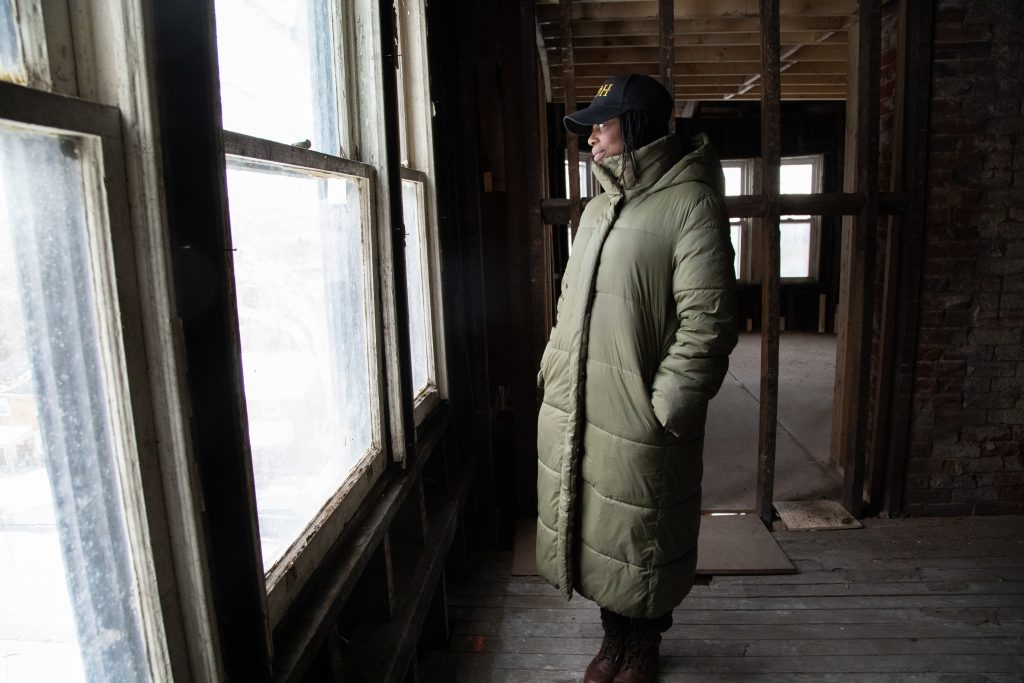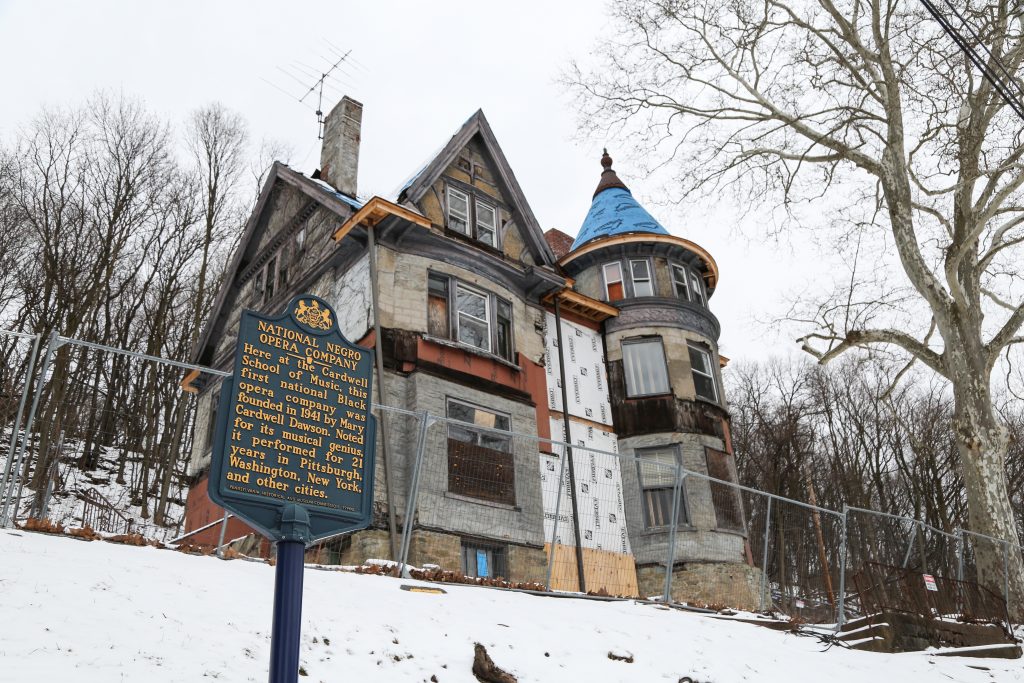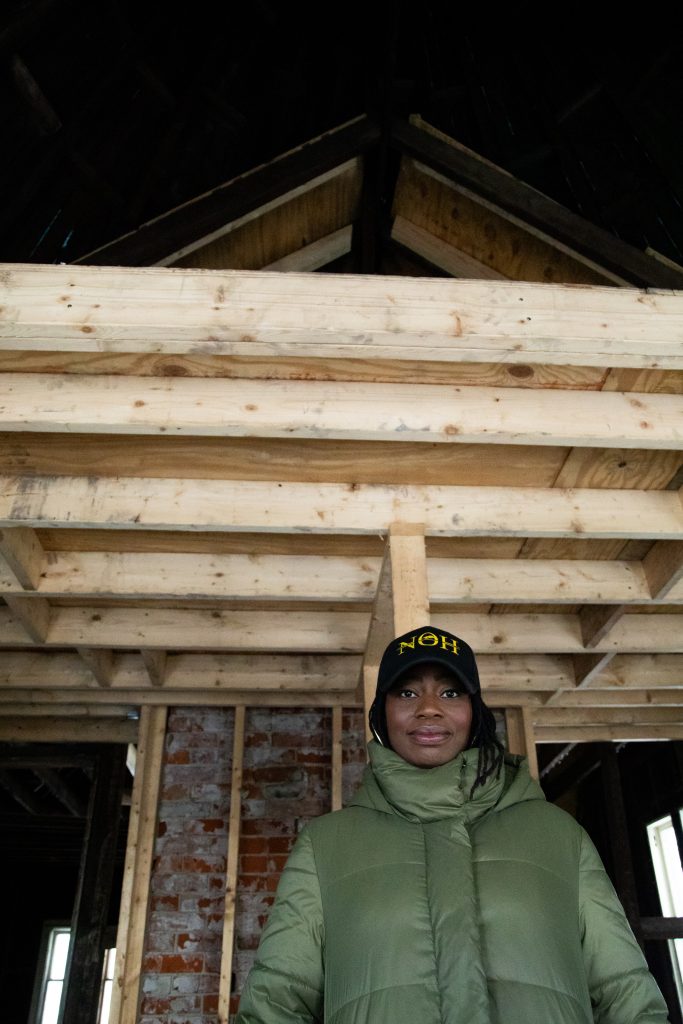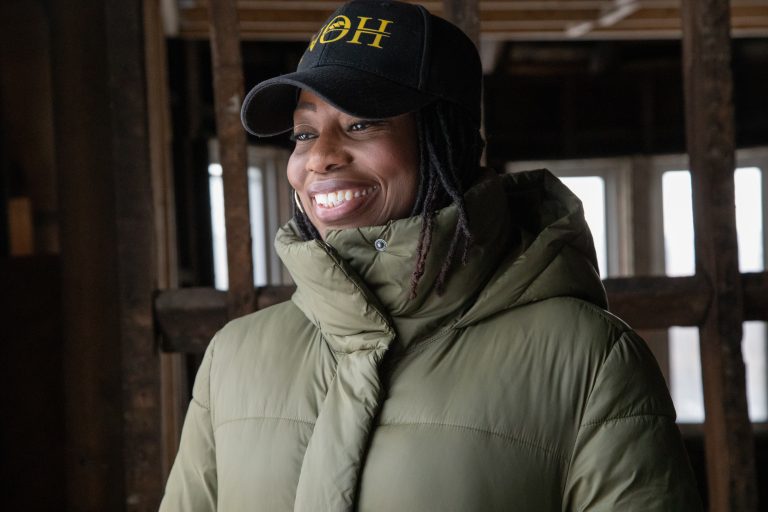The executive director of the National Opera House says the landmark’s historic value is key to the community’s future.
By Nate Guidry
It was pure serendipity that Jonnet Solomon stumbled upon 7101 Apple Street 24 years ago. She was driving when she saw the three-story home on the border of Pittsburgh’s North Homewood and Lincoln-Lemington-Belmar neighborhoods. The house had fallen into terrible disrepair.
“I saw the house and thought what an amazing structure,” says Solomon. “I pulled my car over, got out, and walked over. It was boarded up. I didn’t know who owned it and I didn’t know the history behind it. I gave myself a quick tour, and afterward, I saw the historical marker out front. I asked everyone I knew about the house, and no one knew anything. I Googled it and the result was zero. This was in 2000 before Facebook. We were the first ones to put up a Bing article.”
Built in the late 1800s, the residence had been owned by William “Woogie” Harris, a prominent Black businessman and older brother of pioneering photographer Charles “Teenie” Harris. From the 1930s through the 1950s, it had been a magnet for Black celebrities from the world of sports, music, and business, including Roberto Clemente, Count Basie, Billy Eckstine, Lena Horne and Joe Louis.
It also had been the home of the Cardwell School of Music and the National Negro Opera Company (NNOC). Founded in 1941 by Mary Cardwell Dawson, a trailblazing graduate of the New England Conservatory of Music, the NNOC trained up-and-coming musicians and presented performances in Pittsburgh, New York, Chicago, and other cities. The group was captured in a 1941 Teenie Harris photo while performing Verdi’s opera Aida at the now-defunct Syria Mosque performance venue in Pittsburgh’s Oakland neighborhood.
Dawson also founded the Cardwell Dawson Choir, which performed at the World’s Fair in New York in 1939. Among her early students was the iconic jazz pianist Ahmad Jamal, a National Endowments of the Arts Jazz Master. Jamal passed away in April 2023.

Solomon, 48, of Green Tree, was born in Georgetown, Guyana. Her father, Phil Solomon, a preeminent steel pan maker, musician, and bandleader, moved his family to the United States in 1984, first settling in the Bronx before moving to Dormont, Pennsylvania, in 1985.
In 2000, Solomon, a recent college graduate, and Miriam White, a Homewood business owner who died in 2009, purchased the property for $18,000 with plans to restore it and make it a center for Black culture in Pittsburgh.
“No one supported me in this except Mrs. White,” said Solomon. “When I bought the property, I had just graduated from Duquesne University, and I lived at home. I told my parents that I found this house and that I was going to buy it and restore it. My parents were like, ‘you need to find your own house and get out of our house before you think about buying some place to fix up for fun.’ My sisters and friends thought I was crazy. All I’ve heard was, ‘This project will never happen,’ for 20 years.”
It’s been a long, expensive but vital journey that is far from over.
Solomon talked to BlackPittsburgh.com about her monumental undertaking. Her comments have been edited.

Where do things stand with the house now?
We have successfully completed stabilizing the house. That is a short statement, but it is a monumental achievement. We are starting from a house that was abandoned in 1976 and was placed on the [National Trust for Historic Preservation’s] eleven most endangered [historic places] list. It’s now on the path to being preserved. We were able to stabilize the roof and get it to a point where we can do actual construction.
How bad was the property when you purchased it?
I’ll answer that question by defining the [National Trust’s] most endangered list. In America, you have thousands of structures that are on the verge of collapsing and some of those structures are listed as critical. We were on that list. That’s how bad it had gotten. We pulled it from that ranking to being fully stabilized and on the path to preservation.
In the research we discovered Teenie Harris and Woogie Harris. We learned how Woogie was the bank for Pittsburgh’s Black community. We learned how Mary Cardwell Dawson changed the entire opera industry.”
Jonnet Solomon, Executive Director, National Opera Company
How much did that cost?
It cost about $2 million just for the stabilization process. We were wrong in a lot of estimations because we didn’t know how bad the house was. For example, we thought it would be about $12,000 for the asbestos removal. It was almost $200,000. We knew the roof was bad but when we got into the roof work, it was another $300,000 to get the roof right. We were able to stabilize the house to the point where, on Sept. 30, 2023, we hosted a luncheon for the National Trust for Historic Preservation. We hosted 60 people. People came from around the country to see the house and celebrate the success of where we are today.


In 2000, when Solomon purchased the home with Mariam White for $18,000, the house was on the National Trust’s “11 Most Endangered Historic Places” list. Photo Credit: Rebecca Droke
How did you raise the money to do the first phases of the project?
We raised it from foundations (The Richard King Mellon Foundation, Andrew W. Mellon Foundation, Allegheny Foundation, The Burke Foundation, African American Cultural Heritage Action Fund), and individual contributions. We started a workforce development program, training people in the field of construction preservation and administration in order to have a solid team when it’s time to begin the construction process. We were able to train four cohorts in preservation construction. You have contractors and carpenters that can build and repair a house but not many people are trained in preservation construction work. People know how to do demolition work, but we had to do deconstruction which takes longer and is more expensive. We are tearing down things that we are using again. Another place where we underestimated the cost. But if we wanted to save the beautiful wood antique doors, [we had to do it].
How much more money do you still need?
We anticipate that to finish the construction work and rebuild the amphitheater, we need to raise $10 million more. We thought the entire budget would be $3 million and maybe in 2000 when we started it was $3 million. But today in 2024, it’s closer to $10 million to really preserve the house as it should be.
When do you anticipate being able to open?
That question is like asking me the date of my death. The short answer is I don’t know. Raising the money for the construction is its own task. We don’t have the money raised nor do we have a strategy of how to get it raised. Right now, we are aligned with the African American Cultural Action Fund for Preservation, which is part of the National Trust, and we are aligned with local foundations. We have people who want to support finalizing the project.
Lena Horne, Cab Calloway, Joe Louis, Mary Lou Williams, and the list goes on. Musicians, athletes, and racketeers all sharing the same space at the same time. How did that culture shape Black Pittsburgh? What are we missing today by not having that culture now?
Jonnet Solomon, Executive Director, National Opera Company
How did your interest in the property evolve over time?
I felt like this would be a great community service project. This was in 2000. There’s a lot of history in the house. When I spoke with John Brewer, an art historian, he told us to gather as much information as we could about the house. We collected 13 years of data. In the research we discovered Teenie Harris and Woogie Harris. We learned how Woogie was the bank for Pittsburgh’s Black community. We learned how Mary Cardwell Dawson changed the entire opera industry.

What other challenges did you encounter along the way?
It’s been a challenge for me for many reasons. I’m not from here. I have no relation to the house. No relations to Mary Cardwell Dawson or the Harris family. The only reason I’m doing it is because I was called to do it and it’s necessary.
What’s kept you engaged all these years?
When I started the project, I understood the importance of it. Everyone who started this with me has passed away.
Who are some of the people that came through the house?
Lena Horne, Cab Calloway, Joe Louis, Mary Lou Williams, and the list goes on. Ahmad Jamal took piano lessons there at age seven. Musicians, athletes, and racketeers all sharing the same space at the same time. How did that culture shape Black Pittsburgh? What are we missing today by not having that culture now?
What do you think having the building restored will do for the community?
It will be one of the catalysts for rebuilding the community. People say: who would want to come to Apple Street? Joe Louis came to Apple Street. Lena Horne [and] Cab Calloway came to Apple Street.
When you envision the final product what do you see?
I envision a space that will allow artists and the community to be better than they are today. It will be a space to build wealth and foster creativity and freedom. You will be able to come here and discover who you are. This will be a space that evolves humanity.
Nate Guidry is a Pittsburgh-based photographer specializing in portraiture.


